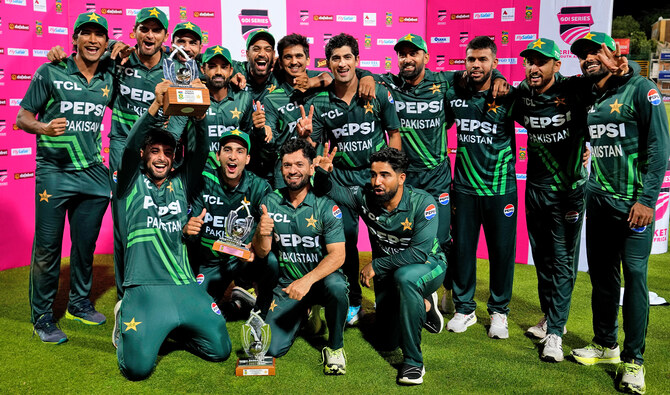KARACHI: A tax amnesty scheme by the Pakistan government that bars authorities from questioning investors, builders and buyers about their sources of income if they put cash in the real estate sector might be “opening the doors of corruption,” observers said this week.
In April, Pakistan announced new incentives for the real estate sector, and Prime Minister Imran Khan’s flagship five million Naya Pakistan Housing Program (NPHP), in the hopes a construction boom would help boost the country’s fragile economy that has contracted by 0.4% for the first time in 68 years.
At the center of the scheme is allowing people to invest their illegal wealth, or black money, in the construction sector without having to disclose the source of income. Illegal wealth in Pakistan is estimated to be as large as 56% of the $278 billion economy, according to Bloomberg.
The housing ministry says Pakistan, a country of over 220 million people, currently has a shortage of 11 million homes — expected to grow to 13 million by 2025, as per figures by property website Zameen.com.
“When we have to achieve tax collection targets we need documentation of the economy,” Zaigham Mahmood Rizvi, chairman of the Naya Pakistan Housing Program task force, told Arab News this week. “The money that is out of the system, when it will be brought into the system, its sources will not be asked, meaning no tax will be imposed.”
“The amount that might be collected through taxes on such money will not be as much as collected through the investment in construction activities both directly and indirectly and the money that will come in the system will remain white; that can’t be black,” Rizvi added.
“That is a positive move,” he said. Some observers believe otherwise. Through this scheme, said Khurram Husain, business editor at the major Pakistani newspaper Dawn, “the government is opening doors of corruption, not closing.”
Chairman of the Naya #Pakistan Housing Program task force calls govt’s tax amnesty scheme for real estate “a positive move” which observers view as “doors of corruption”.
-
Read special by @Khurshid72https://t.co/05XbQZ82WD pic.twitter.com/MRPfxPyQld— Arab News Pakistan (@arabnewspk) July 31, 2020
“Those who have parked black money out of the system, they don’t see any benefit of whitening,” Husain said. “They don’t get the desired returns in the formal economy that they draw in the black economy.”
While people could earn returns of up to 40-100% “through rackets and illegal activities,” he said, “in the formal economy if you earn 11% return you are lucky.”
Rizvi, who denied the new scheme would boost corruption, said tax breaks were not the only incentive being offered. Other major incentives include bank financing to developers of Naya Pakistan Housing Program projects at five and seven percent and regulatory approval for projects within 45 days.
“Huge incentives have been given to investors for investing, including financing as low as five percent,” Rizvi said.
“The structure of the scheme is good,” said Dr. Vaqar Ahmed at Pakistan’s Sustainable Development Policy Institute (SDPI). “To support budgets, economy and jobs in COVID-19 times, many countries are introducing these kinds of schemes.”
However, he said the timing of the scheme might not be ideal given the coronavirus pandemic.
“If you want to attract savings of common citizens into the construction sector then probably the timing is not right because due to coronavirus their savings are already depressed, people want cash savings,” Ahmed said.
But builders and developers say the new incentives will reduce the demand-supply gap in the housing sector and help rationalize the cost of housing in the country.
“It is the game of supply and demand and if the supply is increased the prices will automatically come down,” said Muhammad Hassan Bakshi, a member of the Naya Pakistan Housing Program task force and a former chairman of the Association of Builders and Developers of Pakistan.
Builders and developers demand that RERA should not be the 19th agency to regulate real estate sector in #Pakistan and should provide one stop solutions
-
Read special by @Khurshid72https://t.co/05XbQZ82WD pic.twitter.com/H6HrTnyOlh— Arab News Pakistan (@arabnewspk) July 31, 2020
He said it currently took 2.5 years to get approval for projects from regulatory bodies, which was one of the major reasons for high costs of housing.
“But now the timeline of the projects has been shortened,” Bakshi said. “You have to complete at least grey structure by September 2022 if the project was approved in September this year.”
He added: “Now if you have purchased a plot and you will be bound to start construction that will create thousands of jobs and economic activity. Substantial progress on ground will be visible in next three months.”
In another major development, Pakistan’s central bank has also set mandatory targets for banks to increase housing and construction financing to at least five percent of private sector credit by December 2021. The State Bank has also instructed banks to present a concrete action plan in this regard within 15 working days.
Pakistan now also plans to set up a Real Estate Regulatory Authority, though stakeholders fear it will just add to the already thick layer of regulatory bureaucracy.
“At present we have to take approvals from almost 18 different government agencies,” Bakshi said. “Our concern is that it should not be the 19th agency, instead it should replace the other 18 agencies and operate as a one window facility.”
But Rizvi, the task force head, said things would improve for the real estate industry in the near future.
“Substantial progress has been made as a majority of the [housing] projects are at the advanced stage mostly in Punjab, Khyber Pakhtunkhwa (KP) and Balochistan,” he said, adding: “By the end of the year more projects will materialize.”
















